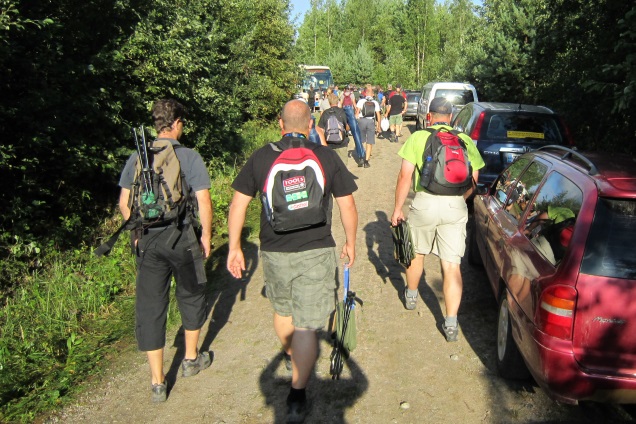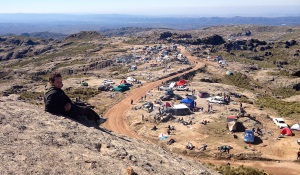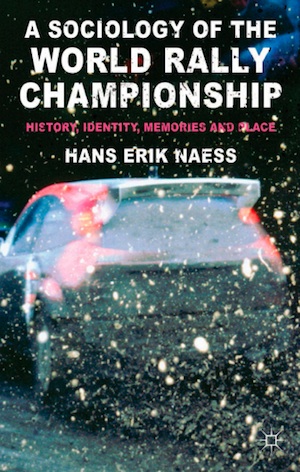The worst thing is the sand and the heat. Whether to open the window or not is a choice between heatstroke and Pneumoconiosis.
For several days rally drivers battle their way through 5600 km of Ivory Coast's narrow and dusty roads and cross rivers on hand operated ferries. The thermometer in the car shows 60 degrees. Rally Cote d'Ivoire or the Ivory Coast Rally is a thrilling, brutal race through demanding terrain that only ten of the 60 drivers manage to finish. For residents along the road and spectators at home in front of their TVs this race has been one of the year's highlights.
This was in 1979. At that time this motorsport, which Petter Solberg has made popular in Norway, was much more an adventure than it is today.
Rally has gone from being a niche sport for the specially interested to becoming a commercial event with more than 600 million television spectators each year. Rally has become bigger and more professional, but also flatter, in the opinion of many fans. Those fans long to return to the old days when there was more focus on the sport itself and its qualities than on spectacular marketing stunts and sponsor events.
But an elite sport cannot be run without money. So how how can the sport grow economically, attract new fans and yet still preserve the sport’s unique qualities?

For Hans Erik Næss it is important to emphasize that the sporting authorities can learn a lot from better cooperation with sociology. Photo: UiO
History as selling point
In his doctoral dissertation that he will publicly defend on 28/11/2014 Hans Erik Næss explains that the passion of nostalgic fans can be as good an inspiration for the further development of rally as a sport as the ideas of the marketing experts.
- My findings provide a clear conclusion: If the sport is to increase its popularity it must take its own history more seriously. Instead of adapting rally to a commercial marketing logic, the FIA (Fédération Internationale de l'Automobile) should concentrate on what made rallying popular to begin with. Rally history should be used as a sales argument, says the sociologist.
Naess, who has been rally fan since his childhood in the 1980s, travelled to Argentina, Finland, Monte Carlo, Norway and several other places to talk with fans and experience the World Rally Championship (WRC) races with them. To feel the fascination for the sport, to understand what creates excitement and irritation among the fans, you must be where it happens and work ethnographically, says Næss.
It was out there with the fans that he learned how important history is in rally. Memories of major races and famous competitors bind the rally community together.
- Fans disagree over a great deal. But whether they are for or against commercialisation, all of them believe that sport is not going to survive if it does not preserve its distinctiveness – that which made the sport popular and unique to begin with, he says.
"Positive nostalgia"
What the fans have in common is that they are driven by Næss he calls "positive nostalgia":
- Everyone I spoke with mentioned the past when discussing Rally’s problems today. Many maintain their interest with the idea that everything will once again be as it should be, he says.
This also applies to fans who only know rally’s past through the stories, like Bruno from Norway:
"I've read and seen a lot about rallies in the 1980s. Today’s rallies are fun, but I feel I've missed out on the real fun", he told me and gave examples of roaring Audis and flame throwing 205's (Peugeot) that stormed along narrow mountain roads. "In those days," he said, "cars were monsters and men were men."
Nostalgia is a goldmine for the sport, points out the researcher:

A hike into the forest, Rally Finland 2010. Photo: privat
- This nostalgia shows that people care. The FIA should recognize its importance and use the best of the past to create a better future for rallying. For many nostalgia a positive inspiration to improve the championship. One uses history’s ups and downs to emulate the best and to try to avoid the worst.
One way to utilize this nostalgia is to invite fans to vote for the races they want to see more of in the calendar.
- Some races, the Safari Rally for example, are no longer part of the World Champonship, although many fans want it back on the calendar. This is just one example that the races that many fans want to see are determined by the history. In the case of the Safari Rally there are many reasons why it is difficult, but it is not impossible, he says.
Critical to "streamlining"
History however does not appear to play a big role for those responsible in the FIA, which organizes the World Championship races.
In order to win the attention of spectators and sponsors they have tried to adapt rallying to a commercial logic. The races were held in a media friendly "Red Bull" format, a mixture of rock concert, amusement park and sport – the standard concept that is currently used to hype nearly all major sporting events.
Instead of safeguarding the unique peculiarities of the individual places where rallies are held, FIA chose to "streamline" the sport to make it less complex and more coherent. The requirements to be able to arrange a rally as part of the WRC - also in relation to security and crowd control - is extensive and a amin reason why two of the toughest and most spectacular races - Safari Rally and Rally Ivory Coast - could no longer be part of the World Championship.
Such restrictions not only negatively affect the attitude of the fans, but they also hinder the effective promotion of the sport.
Alejandro, one rally fan the sociologist met in Argentina and traveled with, put it as follows:
- If you streamline all these races into a specific commercial form, you will not have a diverse set of experiences that you can then market to people. In the historical and journalistic descriptions from Argentina or Finland it's exactly the geographically and culturally uniqueness of these various locations that are highlighted. Diversity is also a selling point of the race series to TV channels. Alejandro stressed that one should look at the series as a whole and not just at each race isolated. It's about diversity in terms of both spectators and all the local customs that exist at each location.

Rally Argentina 2012. Photo: privat
Rally Fever
The site of the race in Argentina is one of the places where rallying traditions are still alive and well.
- There are stages deep in the mountains where where people show up in their tens of thousands and thus show their support for how this race is organised. It is perhaps the best example that some of the sport's core values are still very important.
- The way races are organised, you need to come early, take a long walk into the forest or far off somewhere and then wait for some time before anything happens. In Argentina people pass the time chatting with anyone and everyone, grilling food, drinking and generally enjoying themselves. There is then action for an hour or two and then everyone goes home. This is done in any weather. And if you get people to realize that it is fun, then you have laid the foundation for what Alejandro calls rally fever.
- Rally Fever, he said, is the most important factor to get new people to interested in the sport: to stand out in nature for hours waiting for something to happen, and then to enjoy the moment when it first happens.
Collaboration between sporting authorities and cultural sociology
For Naess, it is important to emphasize that the sporting authorities can learn a lot from better cooperation with sociology:
- There is an untapped potential from bringing together cultural sociology and sport organisations, he asserts.
- I think we can greatly benefit from each other whether it concerns football, motorsport or Norwegian skiing. Sport is a culturally complicated affair. The better you understand what creates enthusiasm, provocation and dialogue, the better foundation you have for implementing change, he concludes.

